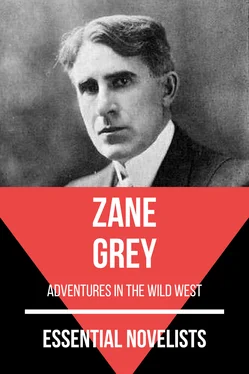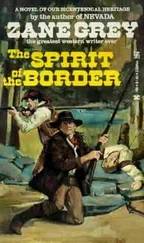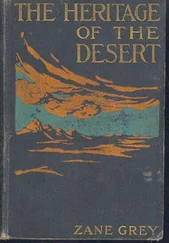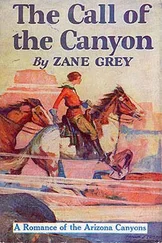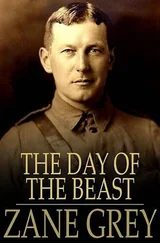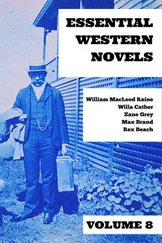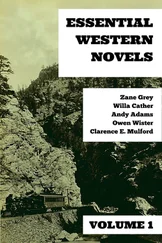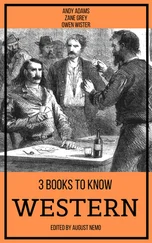When he awoke, day had dawned and all about him was bright steel-gray. The air had a cold tang. Arising, he greeted the fawning dogs and stretched his cramped body, and then, gathering together bunches of dead sage sticks, he lighted a fire. Strips of dried beef held to the blaze for a moment served him and the dogs. He drank from a canteen. There was nothing else in his outfit; he had grown used to a scant fire. Then he sat over the fire, palms outspread, and waited. Waiting had been his chief occupation for months, and he scarcely knew what he waited for unless it was the passing of the hours. But now he sensed action in the immediate present; the day promised another meeting with Lassiter and Jane, perhaps news of the rustlers; on the morrow he meant to take the trail to Deception Pass.
And while he waited he talked to his dogs. He called them Ring and Whitie; they were sheep-dogs, half collie, half deerhound, superb in build, perfectly trained. It seemed that in his fallen fortunes these dogs understood the nature of their value to him, and governed their affection and faithfulness accordingly. Whitie watched him with somber eyes of love, and Ring, crouched on the little rise of ground above, kept tireless guard. When the sun rose, the white dog took the place of the other, and Ring went to sleep at his master's feet.
By and by Venters rolled up his blankets and tied them and his meager pack together, then climbed out to look for his horse. He saw him, presently, a little way off in the sage, and went to fetch him. In that country, where every rider boasted of a fine mount and was eager for a race, where thoroughbreds dotted the wonderful grazing ranges, Venters rode a horse that was sad proof of his misfortunes.
Then, with his back against a stone, Venters faced the east, and, stick in hand and idle blade, he waited. The glorious sunlight filled the valley with purple fire. Before him, to left, to right, waving, rolling, sinking, rising, like low swells of a purple sea, stretched the sage. Out of the grove of cottonwoods, a green patch on the purple, gleamed the dull red of Jane Withersteen's old stone house. And from there extended the wide green of the village gardens and orchards marked by the graceful poplars; and farther down shone the deep, dark richness of the alfalfa fields. Numberless red and black and white dots speckled the sage, and these were cattle and horses.
So, watching and waiting, Venters let the time wear away. At length he saw a horse rise above a ridge, and he knew it to be Lassiter's black. Climbing to the highest rock, so that he would show against the sky-line, he stood and waved his hat. The almost instant turning of Lassiter's horse attested to the quickness of that rider's eye. Then Venters climbed down, saddled his horse, tied on his pack, and, with a word to his dogs, was about to ride out to meet Lassiter, when he concluded to wait for him there, on higher ground, where the outlook was commanding.
It had been long since Venters had experienced friendly greeting from a man. Lassiter's warmed in him something that had grown cold from neglect. And when he had returned it, with a strong grip of the iron hand that held his, and met the gray eyes, he knew that Lassiter and he were to be friends.
“Venters, let's talk awhile before we go down there,” said Lassiter, slipping his bridle. “I ain't in no hurry. Them's sure fine dogs you've got.” With a rider's eye he took in the points of Venter's horse, but did not speak his thought. “Well, did anythin' come off after I left you last night?”
Venters told him about the rustlers.
“I was snug hid in the sage,” replied Lassiter, “an' didn't see or hear no one. Oldrin's got a high hand here, I reckon. It's no news up in Utah how he holes in canyons an' leaves no track.” Lassiter was silent a moment. “Me an' Oldrin' wasn't exactly strangers some years back when he drove cattle into Bostil's Ford, at the head of the Rio Virgin. But he got harassed there an' now he drives some place else.”
“Lassiter, you knew him? Tell me, is he Mormon or Gentile?”
“I can't say. I've knowed Mormons who pretended to be Gentiles.”
“No Mormon ever pretended that unless he was a rustler,” declared Venters.
“Mebbe so.”
“It's a hard country for any one, but hardest for Gentiles. Did you ever know or hear of a Gentile prospering in a Mormon community?”
“I never did.”
“Well, I want to get out of Utah. I've a mother living in Illinois. I want to go home. It's eight years now.”
The older man's sympathy moved Venters to tell his story. He had left Quincy, run off to seek his fortune in the gold fields had never gotten any farther than Salt Lake City, wandered here and there as helper, teamster, shepherd, and drifted southward over the divide and across the barrens and up the rugged plateau through the passes to the last border settlements. Here he became a rider of the sage, had stock of his own, and for a time prospered, until chance threw him in the employ of Jane Withersteen.
“Lassiter, I needn't tell you the rest.”
“Well, it'd be no news to me. I know Mormons. I've seen their women's strange love en' patience en' sacrifice an' silence en' whet I call madness for their idea of God. An' over against that I've seen the tricks of men. They work hand in hand, all together, an' in the dark. No man can hold out against them, unless he takes to packin' guns. For Mormons are slow to kill. That's the only good I ever seen in their religion. Venters, take this from me, these Mormons ain't just right in their minds. Else could a Mormon marry one woman when he already has a wife, an' call it duty?”
“Lassiter, you think as I think,” returned Venters.
“How'd it come then that you never throwed a gun on Tull or some of them?” inquired the rider, curiously.
“Jane pleaded with me, begged me to be patient, to overlook. She even took my guns from me. I lost all before I knew it,” replied Venters, with the red color in his face. “But, Lassiter, listen. Out of the wreck I saved a Winchester, two Colts, and plenty of shells. I packed these down into Deception Pass. There, almost every day for six months, I have practiced with my rifle till the barrel burnt my hands. Practised the draw—the firing of a Colt, hour after hour!”
“Now that's interestin' to me,” said Lassiter, with a quick uplift of his head and a concentration of his gray gaze on Venters. “Could you throw a gun before you began that practisin'?”
“Yes. And now...” Venters made a lightning-swift movement.
Lassiter smiled, and then his bronzed eyelids narrowed till his eyes seemed mere gray slits. “You'll kill Tull!” He did not question; he affirmed.
“I promised Jane Withersteen I'd try to avoid Tull. I'll keep my word. But sooner or later Tull and I will meet. As I feel now, if he even looks at me I'll draw!”
“I reckon so. There'll be hell down there, presently.” He paused a moment and flicked a sage-brush with his quirt. “Venters, seein' as you're considerable worked up, tell me Milly Erne's story.”
Venters's agitation stilled to the trace of suppressed eagerness in Lassiter's query.
“Milly Erne's story? Well, Lassiter, I'll tell you what I know. Milly Erne had been in Cottonwoods years when I first arrived there, and most of what I tell you happened before my arrival. I got to know her pretty well. She was a slip of a woman, and crazy on religion. I conceived an idea that I never mentioned—I thought she was at heart more Gentile than Mormon. But she passed as a Mormon, and certainly she had the Mormon woman's locked lips. You know, in every Mormon village there are women who seem mysterious to us, but about Milly there was more than the ordinary mystery. When she came to Cottonwoods she had a beautiful little girl whom she loved passionately. Milly was not known openly in Cottonwoods as a Mormon wife. That she really was a Mormon wife I have no doubt. Perhaps the Mormon's other wife or wives would not acknowledge Milly. Such things happen in these villages. Mormon wives wear yokes, but they get jealous. Well, whatever had brought Milly to this country—love or madness of religion—she repented of it. She gave up teaching the village school. She quit the church. And she began to fight Mormon upbringing for her baby girl. Then the Mormons put on the screws—slowly, as is their way. At last the child disappeared. 'Lost' was the report. The child was stolen, I know that. So do you. That wrecked Milly Erne. But she lived on in hope. She became a slave. She worked her heart and soul and life out to get back her child. She never heard of it again. Then she sank.... I can see her now, a frail thing, so transparent you could almost look through her—white like ashes—and her eyes!... Her eyes have always haunted me. She had one real friend—Jane Withersteen. But Jane couldn't mend a broken heart, and Milly died.”
Читать дальше
